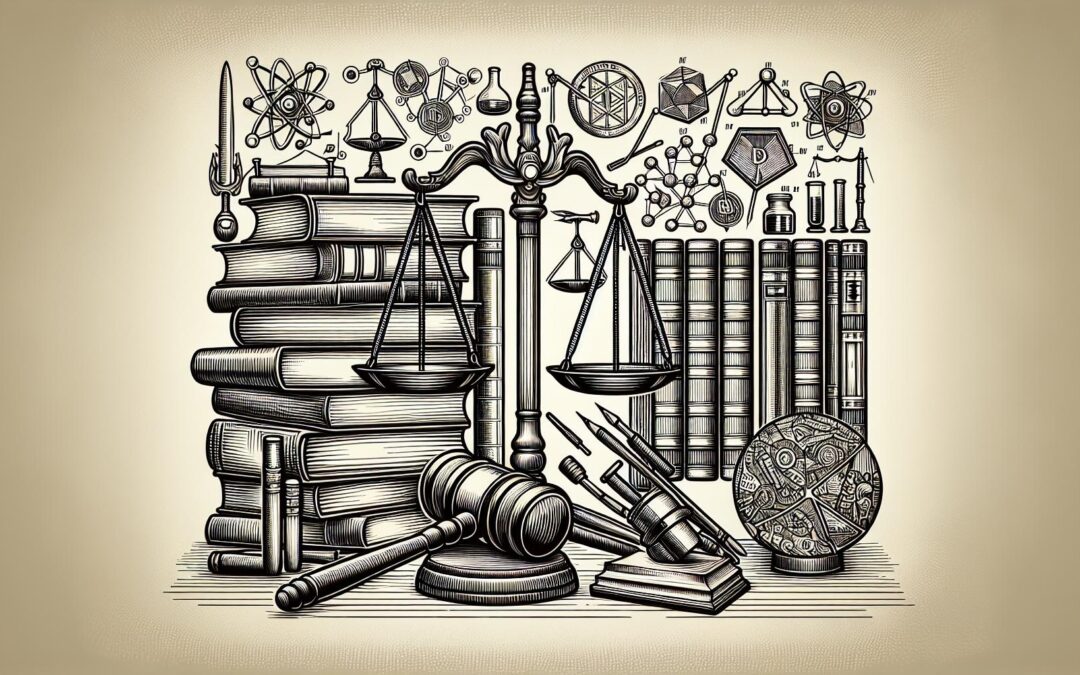In the world of intellectual property (IP), a customer service representative (CSR) plays a crucial role in bridging the gap between customers and the intricacies of IP management. By understanding the essential terminology and processes involved in IP, CSRs can effectively support and assist customers in navigating this complex field. This article will delve into the various aspects of the CSR role in IP, decoding essential IP terminology, exploring the intersection between customer service and IP, examining case studies, and discussing future trends in this dynamic industry.
Understanding the Role of a CSR in Intellectual Property
A CSR (Customer Service Representative) in the field of intellectual property serves as a knowledgeable resource for customers seeking guidance and support with regards to their IP-related queries and concerns. They act as a liaison between customers and IP professionals, providing assistance in understanding and navigating the complex landscape of IP rights and protections.
When customers have questions or need help with their intellectual property matters, a CSR is there to provide them with the necessary information and support. Whether it’s explaining the process of applying for a patent, guiding them through trademark registration, or clarifying copyright requirements, the CSR ensures that customers have a clear understanding of the steps involved in protecting their intellectual property.
Not only do CSRs provide information, but they also play a crucial role in assisting customers with any conflicts or disputes related to intellectual property. This may involve providing guidance on legal options, connecting customers with IP professionals, or facilitating communication between parties involved in the dispute. By offering their expertise and support, CSRs help customers navigate the complexities of IP conflicts and find the best possible resolution.
Key Responsibilities of a CSR in IP
A CSR’s primary responsibilities revolve around providing exceptional customer service while ensuring accurate and timely information delivery. These responsibilities include:
- Responding to customer inquiries regarding IP processes, requirements, and timelines;
- Guiding customers through the application and registration processes for patents, trademarks, and copyrights;
- Assisting in the resolution of IP-related conflicts or disputes, providing guidance on legal options;
- Managing customer accounts and maintaining accurate records of interactions;
- Ensuring compliance with IP regulations and best practices.
When customers reach out with questions or concerns, CSRs are the first point of contact. They are responsible for promptly and professionally addressing customer inquiries, providing accurate and relevant information to help customers make informed decisions about their intellectual property. CSRs must stay up-to-date with the latest IP regulations and requirements to ensure that the information they provide is current and accurate.
Throughout the application and registration processes, CSRs guide customers step-by-step, ensuring that all necessary documentation is completed accurately and submitted within the specified timelines. They provide detailed explanations of the requirements and help customers understand any potential challenges or pitfalls they may encounter along the way.
In cases where conflicts or disputes arise, CSRs play a crucial role in assisting customers in finding a resolution. They offer guidance on the available legal options and connect customers with IP professionals who can provide further assistance. CSRs act as a bridge between customers and the legal system, helping customers navigate the complexities of IP law and ensuring that their rights are protected.
In addition to their direct interactions with customers, CSRs also manage customer accounts and maintain accurate records of all interactions. This includes documenting customer inquiries, recording any advice or guidance provided, and updating customer information as needed. By maintaining detailed records, CSRs ensure that all customer interactions are properly documented and can be easily referenced in the future.
Furthermore, CSRs are responsible for ensuring compliance with IP regulations and best practices. They must stay informed about any changes or updates in IP laws and regulations, and ensure that customers are aware of their obligations and responsibilities. By staying up-to-date with the latest developments in the field, CSRs can provide accurate and reliable information to customers, helping them navigate the ever-changing landscape of intellectual property.
Required Skills for a CSR in IP
To excel in the role of a CSR in intellectual property, individuals must possess a unique combination of skills and knowledge. These include:
- Deep understanding of IP processes: A CSR must have a comprehensive understanding of the various elements of IP, including patents, trademarks, and copyrights, in order to effectively guide customers. This includes knowledge of the application and registration processes, legal requirements, and timelines.
- Excellent communication: Strong communication skills are vital for conveying complex concepts and information in a clear and concise manner to customers with varying levels of familiarity with IP. CSRs must be able to explain technical and legal concepts in a way that is easily understandable to non-experts.
- Problem-solving abilities: CSRs must be skilled in analyzing customer needs and providing tailored solutions, often navigating intricate IP regulations to deliver accurate and practical advice. They must be able to think critically and creatively to help customers overcome challenges and find the best path forward.
- Empathy and patience: Dealing with customers who may be unfamiliar with IP processes requires empathy and patience. CSRs must be able to listen attentively to customer concerns, validate their experiences, and provide reassurance and support throughout the process.
- Attention to detail: Precision and accuracy are essential when handling sensitive customer information and ensuring compliance with IP regulations. CSRs must pay close attention to detail to ensure that all documentation is accurate and complete, and that customer records are kept up-to-date.
By possessing these skills and knowledge, CSRs in intellectual property are able to provide exceptional customer service and support to individuals seeking guidance and assistance with their IP-related matters. They play a vital role in helping customers protect their intellectual property rights and navigate the complex world of IP.
Decoding Intellectual Property Terminology
Intellectual property is a vast and complex field with its own unique terminology. Understanding these terms is crucial both for CSRs assisting customers and for customers themselves. Let’s explore some of the most common IP terms:
Common Intellectual Property Terms
Some frequently encountered IP terms include:
- Patent: A legal protection granted to inventors for new and useful inventions.
- Trademark: A symbol, phrase, or design that uniquely identifies a product, brand, or company.
- Copyright: The exclusive rights granted to creators for their original works of authorship, such as books, music, and software.
- Trade secret: Confidential and valuable business information that provides a competitive advantage.
Patents are a crucial aspect of intellectual property. They are granted to inventors who have created something new and useful. By obtaining a patent, inventors are given exclusive rights to their invention, allowing them to prevent others from making, using, or selling their invention without permission. This protection encourages innovation and rewards inventors for their contributions to society.
Trademarks, on the other hand, are symbols, phrases, or designs that distinguish a particular product, brand, or company from others in the market. They serve as a source identifier, helping consumers recognize and differentiate between different offerings. Trademarks can be registered with the appropriate government agency to provide legal protection and prevent others from using similar marks that may cause confusion among consumers.
Copyright plays a vital role in protecting the rights of creators. It grants exclusive rights to authors, musicians, artists, and software developers for their original works. This means that the creators have the sole authority to reproduce, distribute, display, perform, and modify their works. Copyright protection encourages creativity and ensures that creators can benefit financially from their creations.
Trade secrets are confidential and valuable business information that gives a company a competitive edge. It can include formulas, processes, customer lists, and other proprietary information that, if disclosed, could harm the company’s position in the market. Unlike patents, trademarks, and copyrights, trade secrets do not require registration. Instead, companies must take reasonable measures to keep the information secret and protect it from unauthorized disclosure.
Understanding IP Rights and Protections
IP rights and protections form the foundation of intellectual property. It is essential for CSRs to explain these to customers, ensuring a comprehensive understanding of their rights and responsibilities. Key aspects to cover include:
- Exclusive rights: IP grants exclusive rights to the creator or owner, allowing them to control and profit from their innovations or creations.
- Infringement: Unauthorized use or violation of another party’s IP rights, which can lead to legal consequences.
- Enforcement and remedies: The mechanisms available to protect IP rights, such as lawsuits and monetary damages.
Exclusive rights are at the core of intellectual property. They give creators and owners the power to control and profit from their innovations or creations. These exclusive rights include the right to reproduce, distribute, display, perform, and modify their intellectual property. By having these exclusive rights, creators can fully capitalize on their ideas and creations, ensuring that they receive the financial and recognition rewards they deserve.
Infringement occurs when someone uses another party’s intellectual property without permission or in violation of their rights. This unauthorized use can range from copying a patented invention to using a trademarked logo without authorization. Infringement can have serious legal consequences, including financial penalties and injunctions that prevent further use of the infringing material. It is crucial for individuals and businesses to respect and protect the intellectual property rights of others.
Enforcement and remedies are the mechanisms available to protect intellectual property rights. When someone’s IP rights are infringed upon, they can take legal action to enforce their rights and seek remedies. This can involve filing a lawsuit to stop the infringement and claim monetary damages. The legal system provides a framework to resolve IP disputes and ensure that creators and owners are adequately protected.
The Intersection of Customer Service and Intellectual Property
The connection between customer service and intellectual property goes beyond merely assisting customers with their IP-related needs. Understanding this relationship helps to recognize the importance of effective customer service in IP management.
How CSRs Support IP Processes
CSRs play a vital role in facilitating IP processes by:
- Providing guidance: CSRs assist customers throughout the application and registration processes, offering step-by-step guidance to ensure accurate and complete submissions.
- Addressing concerns: CSRs address customer concerns and inquiries, providing clarity and reassurance during potentially stressful moments in the IP journey.
- Facilitating communication: CSRs act as a bridge between customers and IP professionals, ensuring effective communication and timely responses.
The Importance of Customer Service in IP Management
Effective customer service is crucial in IP management as it fosters trust, loyalty, and a positive customer experience. By providing exceptional service, CSRs contribute to:
- Customer satisfaction: Satisfied customers are more likely to engage in long-term partnerships, renew their IP protections, and refer others to the organization.
- Customer retention: Building strong relationships through quality customer service ensures customers remain loyal, reducing churn rates.
- Reputation management: Positive customer experiences contribute to a favorable reputation, attracting new customers and enhancing the organization’s brand image.
Case Studies: CSR in Intellectual Property
Examining case studies of successful CSRs in the field of intellectual property provides valuable insights into effective customer service practices and lessons learned from challenges encountered.
Success Stories of Effective CSR in IP
One success story involves a CSR who excelled in assisting inventors with the patent application process. With their comprehensive knowledge of IP processes and exceptional communication skills, they guided inventors through the complex requirements, resulting in successful patent grants and satisfied customers.
Lessons Learned from CSR Challenges in IP
Challenges encountered by CSRs in the IP domain serve as learning opportunities for the industry. For instance, cases involving trademark disputes highlighted the importance of accurate information gathering and empathetic communication in finding amicable resolutions.
Future Trends in CSR and Intellectual Property
As technology advances and the field of intellectual property continues to evolve, future trends will impact the role of CSRs and IP management as a whole.
The Impact of Technology on CSR and IP
Technological advancements, such as automation and artificial intelligence, are transforming the CSR landscape. While these innovations can streamline certain processes, CSRs must adapt to leverage technology effectively without compromising the human touch required in personalized customer service.
Predicted Changes in the CSR Role in IP
The evolving nature of intellectual property will necessitate continuous learning and adaptation for CSRs. The role may expand to include new responsibilities, such as assisting customers with emerging IP rights related to digital assets, blockchain, or genetic innovations.
Conclusion
In conclusion, understanding the vital role of a CSR in intellectual property enables organizations to provide exemplary customer service while navigating the intricate world of IP rights and protections. By serving as knowledgeable resources, CSRs bridge the gap between customers and IP professionals, ensuring accurate guidance and support. With a deep understanding of IP terminology, processes, and key responsibilities, CSRs empower customers to successfully navigate their IP journeys while fostering trust, loyalty, and a positive customer experience. As the field of IP continues to evolve, CSRs must stay abreast of emerging trends to effectively serve customers and adapt to changes in this dynamic industry.










